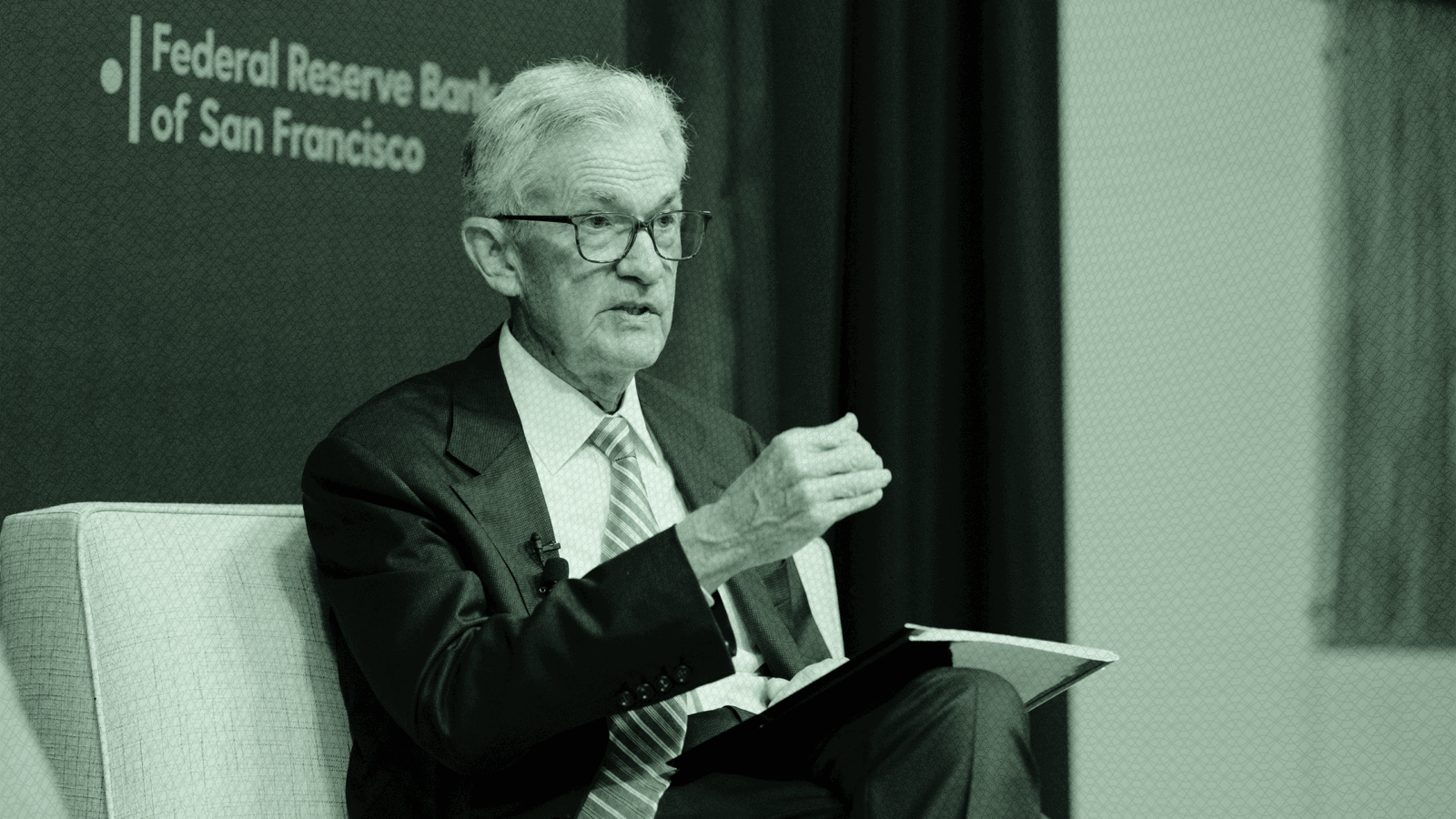Good morning.
It’s time for an extreme makeover: wealth management edition.
Charles Schwab is planning to add 16 new branch locations and expand 25 existing ones to match its growing customer base and cater to its ultra-high-net-worth clientele, which apparently still like to cash checks in person. It also plans to hire more than 400 new employees to wait on their every need, and follows a similar move by JPMorgan in May. Only thing left to do now is “Move That Bus!”
In other news, the Federal Reserve lowered interest rates this week. Join our webinar “Post-Fed Insights on Rates, Risks, and Global Shifts” today at 2 pm for an in-depth discussion with WisdomTree strategists on what that means for clients. The webinar is approved for CE credits.
*Presented by Capital Group. Stock data as of market close on September 17, 2025.
A balanced, multi-asset approach to growth-and-income investing.
What Does the Fed’s Rate Cut Mean for Clients?

It’s not a deep slice, more like a scratch.
Interest rate cuts are something many Americans have long advocated for, especially President Donald Trump, and economists say they may open up new opportunities in the bond, housing and job markets. On Wednesday, nearly a year after the Federal Reserve last lowered rates, the central bank approved another 25 basis-point reduction, prompted partly by weak July and August jobs reports. The effective federal funds rate now sits between 4% and 4.25%, but advisors say it isn’t enough of a shift to warrant significant changes to portfolios or strategies.
“I caution against people treating things as black-and-white certainties, as well as over-connecting the dots between what the Fed does and how the market reacts,” said Peter Lazoroff, CIO at Plancorp Wealth Management.
Settle Down
Not everyone sees the Fed as infallible. Stabilizing the economy is complex, and the Fed relies on limited methods and backward-looking data, said Bill Mann, lead advisor at the Motley Fool. “We tend to think of the Fed as a heart surgeon,” he told Advisor Upside. “It’s not: They’ve got a hammer. They’re shoving money into the market or retracting it. When they go into the system, they need to be ahead of the curve.”
Advisors also stress that sound financial plans already account for countless what-ifs from downturns to career changes. A rate cut just isn’t enough to warrant major adjustments. “We aren’t making wholesale shifts in portfolio strategy but rather keeping the focus on long-term allocations, instead of trading around the Fed’s moves,” said Kate Feeney, VP at Summit Place Financial Advisors.
On Golden Bond
Lower rates often lift bond returns, but much depends on broader market forces, not just the Fed, Lazaroff said. “If you place too much of your fixed-income strategy on one input like Fed policy, you’re going to get burned,” he said. That’s why he favors actively managed, core bond strategies. “You’re not stuck playing in one corner of a huge market,” he said.
Home, Sweet Home. Rate cuts can also bring down mortgage costs. Presidio Advisors founder Josh Radman said many millennial clients see this as a chance to buy their first home. “These are huge decisions, but the rate cut could be the green light to take buying a house off the back burner,” he told Advisor Upside.
However, affordability remains a major question, and clients still need to consider deeply whether they have enough green for that lawn and white picket fence. “Over the past couple of years — especially in expensive cities like San Francisco, New York and Denver — the cost of renting has been dramatically lower than the cost of purchasing,” Radman said.
Millennials Have Changed The Equation For Advisors
Millennials, principal beneficiaries of the Great Wealth Transfer, now make up 57% of advisory clients, according to Betterment’s 2025 Advisor Survey. This shift – occurring sooner than expected – changes the equation for many wealth managers.
Chiefly, the millennial client’s affinity for streamlined technology coupled with personal guidance means that firms gaining traction with today’s thirty-something investor focus on:
- Streamlined tools that give clients instant visibility into portfolios and planning.
- AI support that handles paperwork and routine analysis behind the scenes.
- Human expertise devoted to strategy, insight, and complex goals.
With this foundation, advisors told Betterment, they can scale service and keep relationships personal as they capture new wealth that’s positioned to grow for decades to come.
Advisors and Clients Just Don’t See Eye-to-Eye on the Economy
Advisors and their clients don’t seem to be reading the same economic tea leaves.
While advisors are largely in agreement about inflation risks and bond returns, investors’ expectations are much more scattered, according to a new Vanguard report. Roughly half of individual investors see inflation reaching 4% or higher over the next year, and one in five are bracing for a jump above 6%. Three-quarters of advisors, meanwhile, see it hanging between 2% and 4%. The divergence is likely due to advisors being able to separate emotions from their analysis, as well as the fact that investors have more of a stake in the matter, said report co-author Andy Reed.
“[Advisors are] relying much more on the numbers, the rational side of the equation,” Reed said. “On the other hand, we know from decades of research that [for] investors, the heart guides the head.”
Sticker Shock Therapy
While most advisors expect 10-year US Treasury notes to carry a yield between 3.5% and 4.5%, nearly half of investors predict returns of less than 3.5%. Reed chalks this gap, and the inflation divide, up to individual biases and experiences impacting investor expectations, especially “sticker shock” from higher prices at the grocery store, for example. “If advisors are grounding their expectations, beliefs and outlooks in the fundamentals and this overall macro view, then investors may be grounding their expectations in lived experience.”
Advisors’ emotional detachment may be their superpower. Research suggests behavioral coaching alone can add between 100 and 200 basis points to returns. “A really good advisor can be that emotional circuit breaker when the market gets jittery, when the headlines are all doom and gloom,” Reed added. And that discipline shows up in advisors’ strategies. According to the report:
- Two-thirds of advisors plan to keep bond allocations steady, and another quarter will even add more bonds.
- Investors have kept their fixed income allocations steady over the past three years, with only 8% increasing exposure over that period.
No Crystal Balls. Both camps, however, know they can’t predict the future, nor should they try, Reed said. “To some degree, managing the portfolio is only half the story,” he added. “Where [advisors] really can shine and add value, especially on days like this, is managing clients’ emotions.”
- Discover how alternative ETFs are reshaping portfolios — Download the report.
- Translate Fed moves into strategy — Join WisdomTree’s September 18 session.
How Next-Gen Advisors Are Breaking Into the Industry

When Seyi Olabanji was in high school, thinking about what field he’d like to work in, he did what any Gen Zer would do: He asked the internet.
“I went on YouTube and searched, ‘What’s the best major?’ and found finance,” he told Advisor Upside. He eventually narrowed his options down to financial planning, joined his college’s wealth management club and worked multiple internships. Now, he’s graduating from Michigan State University this semester and is going straight into a job at JPMorgan Chase. He’s fully aware of the challenges ahead. “The average financial advisor is in their 50s. I’m only 21,” Olabanji said. “So being able to build trust with clients is going to be a real challenge for the foreseeable future.”
Thanks, Coach
Nearly three out of every four rookie advisors will leave the profession within their first few years because of trouble getting clients and a lack of guidance, according to Cerulli. It can take years to build a book of business, a daunting task for any advisor, let alone one only a few years out of college. But some managers are stepping in to help.
Michael Bush, with Nicole Cole Financial Services Group, didn’t study finance in college, but his managing advisor has shown him the ropes and provided him with clients already established at their firm. “We share a joint book that she passed down some clients for, but I’m doing prospecting with my own clients, too,” he said, adding that the book is still relatively small, including some family members and young professionals. “I don’t come from a financial background, so there’s a learning curve.”
Place Your Bets. Younger generations are much more fluent with their finances than their parents, which can help build new relationships. Dre Watson, also a finance major at Michigan State, said he appreciates his generation’s enthusiasm for investing, but the approach isn’t as robust as it could be. Many of his peers who are interested in finance are using day-trading platforms like Robinhood and Webull.
“With technology, investing information is more readily available, but they’re taking more of a day-trading route instead of a retirement approach,” he said. “So they’re kind of putting all their eggs in one basket.”
Extra Upside
- Thrill of Ad-Venture. Robinhood launches its first publicly traded venture capital fund.
- Pay Bump. UBS raises advisor wages after defections rise.
- Millennials Hit 57% Of Advisory Client Base. Betterment’s 2025 survey of 500 independent advisors shows how fast the shift came. Firms thriving today pair agile technology with personal guidance, meeting digital-native investors where they live while preserving trusted connections only advisors can provide. See the survey data from Betterment Advisor Solutions.*
* Partner
ETF Upside: Your trusted source for simplified, actionable ETF insights.
Edited by Sean Allocca. Written by Emile Hallez, Griffin Kelly, John Manganaro, and Lilly Riddle.
Advisor Upside is a publication of The Daily Upside. For any questions or comments, feel free to contact us at advisor@thedailyupside.com.
Disclaimer
*Paid non-client. Views may not be representative. See G2 reviews. Learn more.

